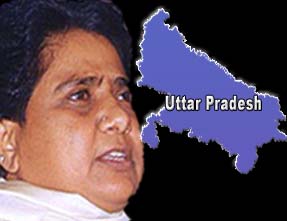Mayawati: the Dalit who would be queen
 New Delhi - "Uttar Pradesh is ours; now it's Delhi's turn," a stocky, 54-year-old, rather matronly woman thunders at election rallies across India.
New Delhi - "Uttar Pradesh is ours; now it's Delhi's turn," a stocky, 54-year-old, rather matronly woman thunders at election rallies across India.
Mayawati, chief minister of the populous northern state of Uttar Pradesh and leader of the Bahujan Samaj Party (BSP), has set her eyes on the country's top job as the world's largest democracy chooses a new government in its ongoing, monthlong, five-phased general elections.
The 25-year-old BSP claims to represent Dalits, the former untouchables, who form the lowest rung of India's archaic Hindu caste system.
Only a small percentage of India's 160 million Dalits have posts of power or affluence. The vast majority, despite decades of affirmative action programmes, still toil as manual labourers, sweepers and scavengers and face discrimination borne of caste bias.
Although untouchability is banned in India, in many rural areas, Dalits are still not allowed to enter temples or drink from common wells.
Mayawati, a Dalit who by dint of education and aggressive, shrewd politics became Uttar Pradesh's chief minister and now aspires to be prime minister of India, is a symbol of hope and of infinite possibility.
Mayawati grew up in a squalid quarter of Delhi, daughter to a clerk. One of eight siblings, she faced discrimination as a girl at home and as a Dalit outside.
But she became a lawyer, a teacher and then, helped by mentor Kanshi Ram, the founder of the BSP, she became politician and chief minister.
Dalits, who comprise about 16 per cent of the country's 1.1-billion population, do not vote en bloc, but in large swathes of northern India, Mayawati and her BSP have caught their imagination.
At rally after rally as she crisscrosses the country campaigning in the elections that got under way last week and continue Thursday, television interviewers ask Mayawati's supporters, "What do you expect of Behenji?" the term for sister.
Most give an answer similar in spirit to the response of many an African American when Barack Obama was elected president of the United States:
It does not matter what Mayawati has done in four stints as chief minister or what she promises to do as prime minister. What she has achieved and her potential of becoming India's first Dalit premier is enough.
Mayawati began her political career cycling from village to dusty village in Uttar Pradesh, urging Dalits to support the BSP. Today, she arrives in helicopters at election rallies, delivering speeches that touch on unemployment, development and terrorism and takes shots at rival parties like the Indian National Congress and the Bharatiya Janata Party (BJP), which, she said, failed to deliver on their promises to the poor.
Mayawati's elections speeches are also peppered with references to "sarvsamaj" - a society of all.
Over the years, the BSP has mellowed its tirades against the upper castes and widened its appeal. The party's 2009 list of candidates includes not just lower castes but also upper caste Brahmins and Muslims.
Analysts said the BSP is sure to improve on its tally of 19 seats in the 2004 general elections if its sweeping win in Uttar Pradesh's 2007 local elections is any indication, but even if it doubles its tally, it cannot hope to form a government on its own.
Mayawati made her game plan clear in July when she rallied together leftist parties and regional leaders to launch a new alliance that would support her as a prospective prime minister.
Many of these parties have since backtracked, but if Congress and the BJP fail to win substantial numbers and the BSP scores well in the elections that end May 13, Mayawati would certainly put in her bid to head a multiparty government or would at least have a say in who does.
Critics, especially the urban elite, tend to dismiss Mayawati as a prime ministerial candidate. They have questioned her worldview, wonder whether she has one at all and, along with her political opponents, point fingers at her unabashed amassing of personal wealth.
Mayawati's birthday - celebrated as swabhimaan divas, or the day of self-esteem by the BSP - is an occasion for her supporters to lavish gifts and funds upon her.
Journalist Ajoy Bose, author of a Mayawati biography, said her constituents likes seeing her in silks and diamonds while Mayawati has been quoted as saying people point a finger at her because she is a Dalit and has money.
Critics also raise continued charges of corruption and her autocratic manner as chief minister and party boss. She is known to be vindictive toward opponents.
But criticism aside, it must be acknowledged that the controversial Mayawati - the magical lady - has changed the face of politics of India.
"Is there a historic parallel anywhere else where a woman belonging to the most crushed community known to mankind has risen through the heat and dust of elections to rule 200 million people and may very well reach further to guide the destiny of a billion more in the not too distant future?" Bose asked in his book. (dpa)